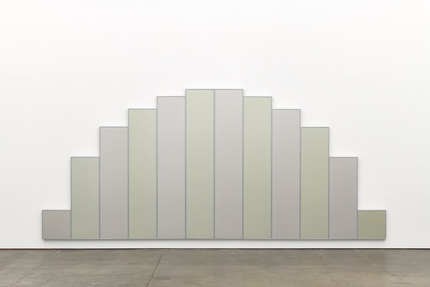Critic's Pick: Tadaaki Kuwayama and Rakuko Naito
by Theodora Walsh
In describing the opening scene of Godard’s Passion (1982), Harun Farocki has remarked that the shot’s unsteady pan—which follows an airplane’s disintegrating white contrail—is actually a register of “the movements of Godard’s eyes, scanning the sky to see what it can tell us.” Tadaaki Kuwayama and Rakuko Naito’s exhibition at Adrian Rosenfeld is a similar pan through the six-decade career of this power couple within the Minimalism movement. In Kuwayama’s Untitled (Diptych), 1969, a bisected blue panel measuring more than seven feet in both directions is mounted beside a bisected white panel of equal magnitude—a sky reduced to its most elemental components. Light falling across the canvases creates the illusion of a color gradient that shifts with the viewer’s position. Across the room, in Kuwayama’s Untitled, 1971, green and gray rectangular canvases of varying sizes are lined up in the convex shape of a bar graph. Like Naito’s works, which veer toward optical illusions, this self-reflexive piece nods to the fact that pattern identification is an essential function of vision, and data visualization has further trained the eye to assign values to shapes. But here, shapes and colors are illegible and devoid of information.
With this reduction of subject matter, other details become apparent: Kuwayama’s monotone paintings are often separated by aluminum strips that entrap the canvases. Hedges come to mind, or formal gardens in which plants are recast as geometric elements. While both artists' work suggests intensive studies of the natural, its hues and symmetries, there is also a brutality to the way each prunes away unwanted wildness. The restrained and proportionally perfect compositions remind the viewer of the artists’ integral roles in the nascent stages of Minimalism, when they worked alongside artists such as Donald Judd and Frank Stella, and Kuwayama showed at the Green Gallery. Kuwayama’s and Naito’s works are perfect, if perfection is understood as a sensual discipline.
